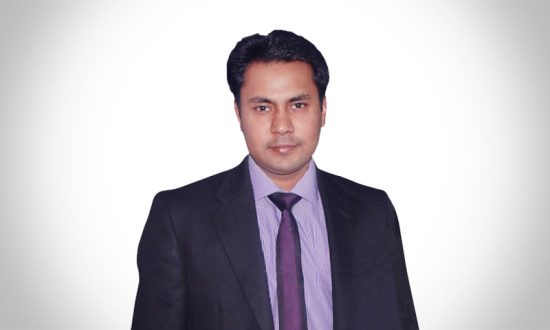Ankur Aggarwal’s name is synonymous with innovation in the edtech sector. Passionate about solving real world problems through the application of technology, he carries an extraordinary zeal with a fervent resoluteness to evolve the tech landscape. His relentless quest to pursue innovation in the fields of enterprise and education has led him to establish numerous edtech companies, delivering solutions that are being applied in more than 25 countries around the globe. With more than 15 years’ experience across the US, the UK and India, innovation runs through Ankur’s veins, as does a tireless pursuit of creative excellence.
Digitization and automation have engulfed every scope and sphere of life. Blockchain is a distributed ledger technology that has immense benefits such as enhanced security and traceability. Thus, blockchain can serve as a good foundation for applications requiring transactions. Blockchain can help to solve most security vulnerabilities and traceability concerns by using a ledger that can keep track of how devices interact. IoT (internet of things) applications have been mainly implemented with technologies such as cloud and fog computing, and AI (artificial intelligence) to help address some of its key challenges. With Bitcoin hitting a trillion-dollar valuation for the first time, interest in cryptocurrency has been sky-rocketing.
Today, blockchain technology, IoT, and AI are recognized as innovations that have the potential to improve current business processes, create new business models, and disrupt whole industries. Blockchain, for example, can increase trust, transparency, security, and privacy of business processes by providing a shared and decentralized distributed ledger.
Over crypto’s 13-year existence, there’s been a lot of speculation about the viability of digital currency. While the future of things like Bitcoin are still being decided, some aspects of what’s driving the growth of crypto today are clear. Gen Z and Millennial buyers make up nearly 94% of all crypto purchases — compared to just 6.14% of buyers over the age of 40. To be precise, Gen Z buyers outpace Gen X buyers by 350%. So not only is crypto a young person’s game — it is by a very wide margin.
For Gen Z, it’s personal. With worries of job security and well-being at a premium, Gen Z is entering a disrupted workplace. Economic and social insecurity is at the heart of their career aspirations, based on what they have witnessed, coupled with almost 2 years of a global pandemic. These conditions present particular concerns about job opportunities and security, well-being and mental health. These concerns rank significantly higher for our survey respondents than issues such as climate change, inclusivity, and equality. Gen Z values organizations that provide opportunities to acquire skills and a good work-life balance. Job insecurity is a big concern, but that doesn’t mean they will accept any job to ‘play it safe’. Young workers seek organizations that provide them with ongoing skill acquisition and a good work-life balance. However, companies who traditionally value incentives such as high compensation, opportunities to work internationally and rapid advancement are less well-matched to this group, suggesting retention may be an issue. This could be a reflection of the pandemic and a possible (albeit temporary) reordering of priorities. The digital natives see tech opportunities, but worry about their own jobs. A generation raised on digital and social media is unsurprisingly comfortable with technology and sees a future world of work that is connected. They see this as a positive and understand that smart technology will continue to change what type of work is done, where it is done, and how it is delivered. Yet, they’re also a generation that has been hard hit economically during the pandemic. It’s no surprise that they have concerns over the impact of digital tech on their own job opportunities. Analyzing data by sector, it’s apparent there are marked differences in views expressed by this generation. In a fast-changing world of work, digital know-how is key for all organizations in creating competitive advantage and transforming their businesses. Organizations value Gen Z candidates who bring tech know-how, innovation and use of technology to solve challenges differently, and more efficiently. Like no other group before it, this generation has an amazing opportunity to influence business for the better, and help build knowledge and awareness across the rest of an organization.
It must be considered that this may be an issue in larger firms, as respondents are much more likely to cite poor work-life balance as a career barrier. Differences exist in what attracts individuals into certain professions. Those in the public sector cite opportunities to acquire professional qualification as the number one priority. However, those in larger firms don’t see this in their top 5 of priorities.
Over the next decade, businesses will reframe their goals to become more resilient, creative, and concerned about preserving long term value. This creates a once-in-a-lifetime opportunity to transform professions, helping organizations survive and thrive well into the future. This decade of opportunity will transform the world of work and sow the seeds for long-term change in a multitude of professions. Today, professionals across the world are critical in helping create sustainable value for organizations, while acting in the public interest. Through a decade of disruption, smart technology and digital work has transformed the global economy and redrawn the jobs landscape. This generational shift has changed how activities are performed, how they are delivered, and where work is done and by whom.
An organizational growth shift will be profoundly impacted by workplace skills and education, fueled by the capabilities needed in various professions. This generation of young workers will be at the heart of such a revolution. They will bring their talent and tech know-how to professions and change them, while pursuing careers with purpose and doing jobs that make a difference. They’ll acquire professional qualifications to secure a grounding in various areas like accounting, finance, business, ethics, technology, and sustainability. They are well-equipped and are expected to apply these transformational skills throughout their careers.




